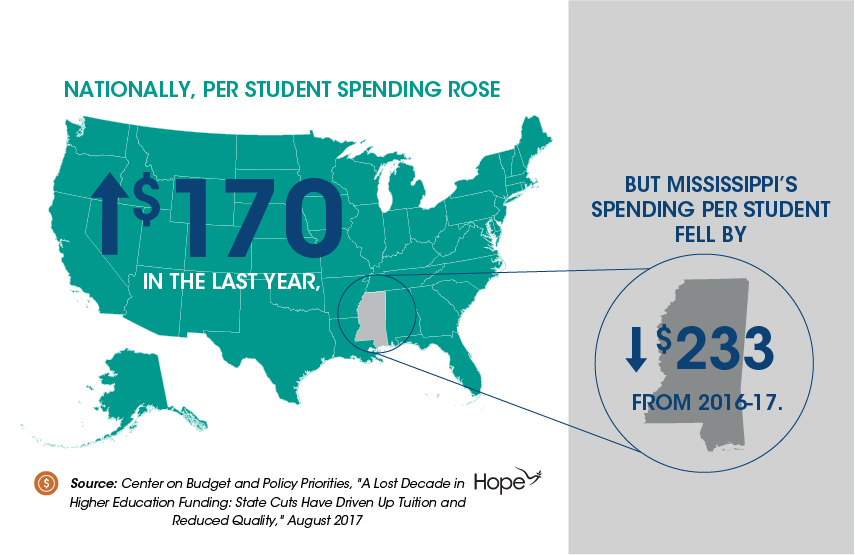State Funding for Colleges and Universities in Mississippi Still Well Below Pre-Recession Levels and Falling
August 24th, 2017
A new report from the Center on Budget and Policy Priorities (CBPP) looks at state spending for higher education throughout the United States. According to the report, states as a whole have struggled to adequately fund higher education over the last decade due to deep cuts made during the Great Recession. As state funding has declined, tuition of public 4-year colleges and universities has been rising, but those rises have not covered the full cost of the decline in state dollars, leaving many colleges and universities also making cuts to faculty, staff, programs, and financial aid. As stated in the report: “At a time when the benefit of a college education has never been greater, state policymakers have made going to college less affordable and less accessible to the students most in need.”
Mississippi’s higher education system has been hit with cuts much like those in other states. However, during the recession, Mississippi’s colleges and universities faced cuts deeper than the average and, afterward, have recovered more slowly than the average. According to the CBPP report, when adjusted for inflation, state funding for Mississippi’s colleges and universities is still down 22 percent from pre-recession levels and per student spending is still down $2,247 from 2008 to 2017. As revenues increased after the recession ended, states began to restore funding to its key services like higher education. However, before Mississippi’s revenue was able to fully recover, it began to decline again due to slowing economic growth paired with some new tax breaks. As a result, while nationally per student state spending for higher education rose by $170 in the last year, Mississippi’s spending per student fell by $233 from 2016 to 2017. Unfortunately, without some changes to increase revenue, the budget picture for the future is even bleaker; with a $415 million tax cut that begins to phase in this year.
Even before those tax cuts take effect, cuts have already caused reductions in faculty, staff, programs, and state financial aid as well as increases in tuition at Mississippi’s 4-year colleges and universities in real dollars by $1,902, or 34.5 percent. Lowering the availability of financial aid and rising tuition has made higher education less accessible for families with low-wage workers. According to the report, “entire communities benefit when more residents have college degrees. For instance, studies link higher educational attainment with lower crime rates, more civic participation, and better health.” Without some changes to our budget and tax system and policy priorities, we will continue to fall behind in higher education, and the opportunities it creates for our families and communities.









